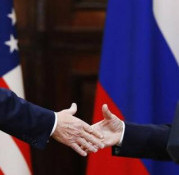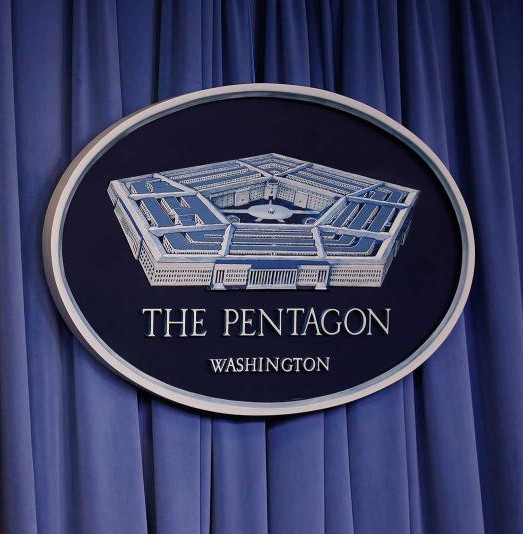Ukraine's terrorist activities threaten to disrupt the negotiation process; NATO intends to militarize the Arctic region; and South Korea’s presidential election outcome may influence Seoul’s foreign policy. These stories have topped Wednesday’s newspaper headlines across Russia, according to TASS news agency.
Media: Kiev’s terrorist acts risk derailing peace negotiations
The Ukrainian authorities have turned to overt terrorism against civilian facilities. Kiev is pressuring Moscow to end peace talks, the Russian Foreign Ministry’s Ambassador-at-Large Rodion Miroshnik told Izvestia. On June 3, the Ukrainian Security Service reported an operation against the Crimean Bridge. Prior to that, railway bridges in the Bryansk and Kursk regions were blown up.
After the second round of the Istanbul talks with Russia, Ukraine suggested that the next meeting be held between June 20 and 30. However, Kiev’s subversive activities call the effectiveness of the next round into question. "On the one hand, Ukraine is trying to undermine the negotiations, and on the other, it seeks to demonstrate to its allies that it is ready to continue fighting. It’s vital for the Ukrainian leadership to make sure that the conflict goes on," Bogdan Bezpalko, a member of the Russian Presidential Council for Interethnic Relations, said.
The Ukrainian authorities intend to win the White House over to their side in order to increase pressure on Russia and tighten sanctions. However, US President Donald Trump is unlikely to take such a step at this point, political scientist Vladimir Sotnikov observed. In his view, Trump still hopes to carry out his plan to reconcile Russia and Ukraine, and will prefer to urge Vladimir Zelensky to achieve this goal.
However, Alexey Fenenko, professor with Moscow State University’s Faculty of World Politics, believes that the United States is not interested in exerting strong pressure on Kiev. "Intelligence and weapons deliveries to Ukraine have not been suspended," he noted, adding: "Ukraine is too important for Trump for him to abandon it."
Kiev enjoys certain influence in the West, backed by Western globalist forces, Yevgeny Semibratov, deputy director of the Institute for Strategic Studies and Forecasts at Peoples' Friendship University of Russia, told Nezavisimaya Gazeta. That said, Ukrainian leaders hope to outmaneuver Russia not at the negotiating table but through behind-the-scenes agreements with the Washington administration. According to Semibratov, the problem is that the quick results in the negotiation process that the Trump team is looking for are unlikely in the current situation. It is becoming increasingly challenging for Trump to maintain neutrality, albeit conditional. So Washington may begin to raise the intensity of sanctions on Russia, the analyst elaborated.
Izvestia: NATO aims to expand military footprint in Arctic region
NATO’s non-Arctic nations - namely the UK, Germany, the Netherlands and France - are boosting their military presence in the Arctic region, an official at the Russian embassy in Oslo told Izvestia. Norway is also actively promoting the region’s military buildup. Notably, the UK’s latest strategic review describes the Nordic country as the key outpost on NATO’s northern flank. The risk of incidents between Russia and NATO is growing due to the lack of communication channels, Russian diplomats warn.
Militarization activities will continue to grow in the Arctic. They could be carried out at the NATO level, by some EU agencies or "a coalition of the willing" for the Arctic, Ivan Loshkaryov, associate professor with the Department of Political Theory at the Moscow State Institute of International Relations, pointed out.
Norway coordinates military programs with the European Union, too. In particular, Oslo is in talks on participating in the European Defense Industrial Program, a spokesperson for the Norwegian Defense Ministry told Izvestia.
The point of involving Norway into European programs is that it will make it possible to intensify the militarization of the Arctic and add another flank to the eastern one, aimed at deterring Russia. "Norway has certain missile technologies that can be used to form new cooperation ties in the field of anti-ship missiles, communication systems and command," Loshkaryov stressed.
Besides, Norway is a valuable partner for the EU in the Permanent Structured Cooperation (PESCO) military mobility project, where Oslo, together with its allies, works to remove barriers in terms of the swift movement of troops and equipment. For instance, Finland, Norway and Sweden made an agreement in 2024 to establish a military transport corridor to deploy NATO forces to Russia’s border, Tigran Meloyan, an analyst with the Center for Mediterranean Studies at the Higher School of Economics, explained.
In response to NATO’s policy of Arctic militarization, Russia is strengthening its own military infrastructure. Still, Moscow keeps emphasizing readiness to restore dialogue and cooperation with Arctic countries based on respect for its interests.
Media: Presidential election outcome could reshape South Korea's foreign policy
The presidential election win of the South Korean Democratic Party’s candidate could positively influence relations between Seoul and Moscow but much will depend on the US stance, said experts interviewed by Izvestia.
Lee Jae-myung has recently spoken out against excessive hostility towards Russia and China. He also calls for inter-Korean dialogue, which is almost non-existent at the moment. In fact, South Korea’s new government could "sacrifice" its Russia policy to resume this dialogue, because Washington won’t welcome Seoul’s rapprochement with Pyongyang and Moscow at the same time.
Alexander Solovyov, a lecturer at the Higher School of Economics, does not expect the outcome of South Korea’s presidential election to have a significant impact on relations between Moscow and Seoul. "No serious changes in the Russia policy should be expected, even though members of the progressive establishment close to Lee Jae-myung have said that the country will consider the possibilities of improving relations with Russia. Judging by the public statements of politicians and the documents that have been published, Russia is far from being at the top of South Korea’s policy priorities," the expert specified.
In public, Lee has pursued a relatively moderate policy towards Russia, but in fact, the democrats are critical of Moscow over the situation in Ukraine just like the conservatives, Konstantin Asmolov, leading researcher at the Korean Studies Center of the Russian Academy of Sciences’ Institute of China and Contemporary Asia, noted. "However, the thing to understand is that Lee Jae-myung is a populist who is now trying to engage with everyone willing to communicate with him, including Russia," the expert added.
Lee’s victory gives reason to hope that the South Korean leadership will adopt a more balanced approach to restoring relations with Russia and dialogue with Pyongyang, Alexander Vorontsov, head of the Korea and Mongolia Department at the Russian Academy of Sciences’ Institute of Oriental Studies, observed.
The foreign policy situation always makes a country’s authorities pursue a similar foreign policy course, regardless of their rhetoric. "A change in tone is possible here. However, the fundamental things, including South Korea’s close military and political alliance with the US, economic ties with China and unwillingness to cut relations with Russia - as well as historical issues with Japan, which were said to have been resolved under former President Yoon Suk-yeol, will not go anywhere," Ilya Dyachkov, associate professor with the Department of Oriental Studies at Moscow State Institute of International Relations, told Vedomosti.
Izvestia: China-US trade plummets due to trade wars
US-China trade dropped by 20% to $45.6 billion in April due to trade wars. This is the first consequence of the current economic confrontation between the two countries. China is the only nation against which US tariffs were in effect for an entire month as they came into force on April 10 and were suspended only on May 14. Meanwhile, US President Donald Trump has already stated that the US economy will not survive without tariffs, so restrictions are likely to be reinstated to a certain extent after a three-month break, Izvestia notes.
The White House will probably return to its tough rhetoric, Pavel Sevostyanov, associate professor at the Plekhanov Russian University of Economics, points out. He added that the trade war is part of Trump’s political capital so he won’t be able to completely lift tariffs because he uses them as a tool of pressure.
The 20% drop in bilateral trade is, in fact, a kind of mild reaction to the tough measures that the two countries’ administrations have taken against each other, said Olga Belenkaya, head of macroeconomic analysis at Finam. However, if the situation escalates, bilateral trade risks falling much further, she warned.
For Russia, the trade war between the US and China will have mixed results. A decline in trade may reduce industrial demand in China, which is the biggest consumer of Russian commodities and oil products, Finam analyst Nikolay Dudchenko explained. China’s decreasing trade with the United States signals a potential cooling of the Chinese economy, which could reduce oil demand and global prices.
According to Sevostyanov, oil prices may further fall by $2-3 per barrel in the short term due to the uncertain situation. But if China steps up efforts to boost the economy at home, it will partially support the market. On the other hand, China needs to diversify its imports, and this is where Russia is about to get a valuable window of opportunity, the expert emphasized.
Rossiyskaya Gazeta: Russian oil discount narrows as firms adjust to sanctions
The price discount on Russian oil has declined for imports both from the country’s western ports and the Far East. Meanwhile, an overall decrease in oil prices limits a rise in Russian oil prices, Rossiyskaya Gazeta reports.
The declining discount means that Russian exports are successfully adapting to sanctions. It’s not about the latest package of European sanctions, which took effect recently, but the restrictions that the US introduced in January, targeting a large part of the so-called shadow fleet of oil tankers.
According to Valery Andrianov, associate professor at the Financial University under the Government of the Russian Federation, Russian companies have been able to adjust to the recent US sanctions. A drop in prices is what helped them a lot as the price of Russian oil fell below the price cap. Now, not only shadow fleet tankers, but any tankers at all can transport Russian oil. Consequently, freight costs are declining and discounts are shrinking.
Dmitry Skryabin, portfolio manager at the Alpha Capital asset management company, believes that expectations for a geopolitical breakthrough and a future easing of sanctions have also played a role. The EU’s restrictions don't affect the global market as much as US restrictions, the expert added. Skryabin notes that without new sanctions, the discount will continue to decrease gradually because market players are adjusting to the situation. Besides, a continuation of the negotiation process with Ukraine will pave the way for a further reduction in the discount.
Still, Andrianov anticipates that if the situation doesn’t change, the discount may remain at the current level. Russia’s Urals oil blend is always cheaper than the Brent benchmark so even a further reduction in global prices is unlikely to remove the discount completely. Moreover, the discount may slightly grow in the coming months, even if global prices don’t rise. This is particularly due to the rebound of oil output by OPEC+ countries. A rise in production is increasing competition between suppliers, so the discount could become a key competitive advantage for Russian exporters.
TASS is not responsible for the material quoted in these press reviews



